You are going to get a little bit of meta-material and genuine game analysis in a single post. That is awesome.
A few years back when I first pitched the idea of “vgconvos” to Andrew and Jeff, one of the first show concepts was to give the other person a somewhat-obscure game from your youth that was played extensively, allow them to play this game they otherwise had never heard of for somewhere between two weeks and a month, and then get back together to talk about it later on. This concept semi-evolved into the “Record Exchange” every nine-or-so episodes over on Lo-Fidelity, but it just never happened with video games. The main reason was that we are all simply at a point in our lives where we cannot guarantee that we will have the time to get together every month to do a podcast, never mind dedicate a couple weeks to a video game and then come back to also talk about it…!
It is still an incredibly worthwhile idea for a show, and one that has somewhat been done in a couple different ways, such as the “Backlog” or “Game Club” sessions on things like Rebel FM. I really wish it was something we could do on a regular basis, but it just cannot happen. Andrew and I even had a few games that we would have used to toss at each other (Boomer’s Adventure in ASMIK World from me, and Rocket Knight Adventures from Andrew). I just absolutely adore the idea of giving something (a video game, an album, whatever) that has such a deep meaning to you… or at least just some rose-tinted memories… over to someone else with zero familiarity and seeing how it holds up.
I have always kept the idea in the back of my head just in case something came along that would work out for the website. You know from reading our posts and listening to our shows that we are no strangers to diving back into older games, either just for the heck of it, or to legitimately see where this modern era of gaming all came from if we happened to miss a step along the way. You have seen me write about FPS games from ten years ago, and most recently, what many consider (myself among them now!) the best 16-bit Japanese RPG ever created. Sure, Andrew and Jeff may or may not have played some of those, but it was more a conversation with myself that you all happened to be able to peer in on.
This one is a little different. Not entirely, but a little bit.
I stumbled across a new store called Game Trader at the Quakerbridge Mall here in New Jersey. If you did not stop to look at some of the cases, it looked like any other generic GameStop-esque store… but then I saw the old video games! There was a splattering of the standard, big NES games and such, but one particular game caught my eye, and I walked out of the store pretty content with myself!
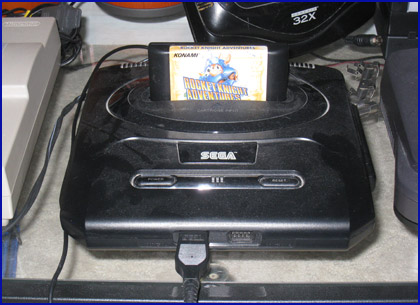
About $7 scored me a copy of Rocket Knight Adventures, a cartridge I have not seen sitting around on any retro-store shelves in quite some time. Remembering that it was a game Andrew would have potentially tossed my way, and also knowing it will soon be seeing another sequel/revival for modern download services, I snatched it up.
I am fairly sure I had never played the game before last weekend. Andrew and the rest of the Internet always spoke highly of it, so I settled in with the ol’ SDTV in the loft for some old-school gaming action. I would like to go on record as saying that my Genesis controller extension cable was one of the best purchases I ever made in the 1990s, and it was a nice help in getting my rear-end reaching to the couch instead of the floor.
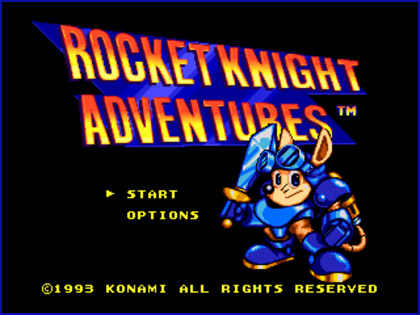
I was expecting something like a cross between Sonic the Hedgehog with some of the other typical 1990s mascot platforming action all mixed in nicely with some Contra shootin’ and slashin’ (courtesy of Nobuya Nakazato)… and that is exactly what I got.
The enemies seemed a little sparse in some of the levels I reached, but there was a really nice balance of standard enemies, terrain obstacles, boss fights, and more. In fact, it seemed rather spastic in how often it would toss those different elements at me, and I could never really be sure how “far” I was into a level. I would be swimming and attacking enemies that shot scattering, blue lasers at me… only to find myself wading through a single screen of a terrain obstacle before I was then on another to the next area.
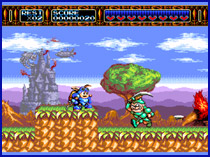
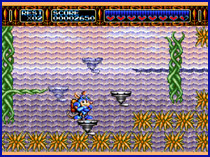
It felt as if the level designers all came up with interesting little ideas completely independent of one another and then hastily had to stick them all together toward the end of the design process. “Hey, you… you worked on a water level, right? Me, too. Let’s just put them next to each other! Oh, and put that mine cart level right after us.”
The obligatory 1990s platformer mine cart level should have been obnoxious, but I found myself both cursing and laughing at it — much like a Mega Man game where part of the fun and challenge is remembering all of the nuances to avoid and jump over, I had a genuinely good time dying, instantly repeating the level, and getting just a tad bit further each time.
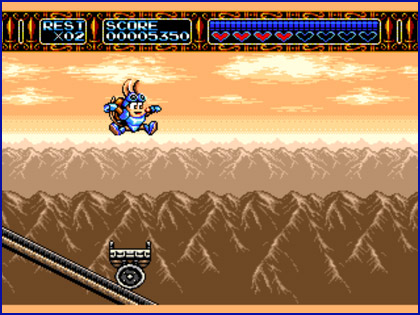
What really blew me away, and what I will talk about with anyone who will listen, was — yet again — another obligatory stage for a 1990s platformer: the lava stage. The only enemy is the lava that continuously rises and falls, giving you ample opportunity to run across to the next ledge that places you just out of reach. If you are paying attention, the game gives you an immediate hint at where this level is going… but for first-time players who are not being particularly observant (like me!), a tiny bout of confusion followed by the “Aaaaaaaaa-HAH!” light bulb moment is what follows.
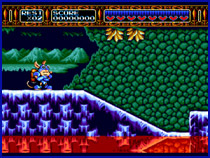
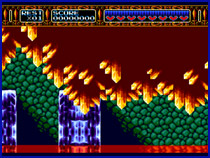
You soon reach a point in the level where the overhang begins to obscure your vision of the ledges in front of you, eventually blinding you completely. How on Earth are you supposed to get across?! Impatient players may charge up Sparkster’s flying attack, used on prior levels to bounce around and over top high ledges. If you simply take a moment to analyze what the game presents to you, its genius soon makes itself apparent.
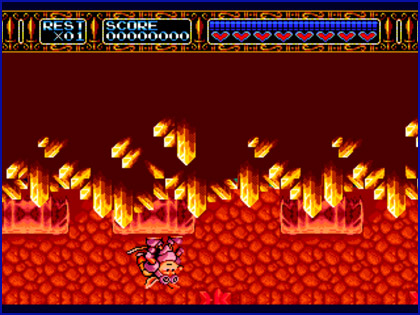
It seems so simple, but I cannot think of a way to describe it other than it “blew me away”. Much like Andrew and I have discussed about Sonic games (specifically Sonic 2), you are forced to slow your ass down and actually analyze your surroundings. Without paying attention to the reflections in the lava, which is shown as soon as you start the level (there is that genius game design at work), it would be impossible to progress through the level.
You have all the tools at your disposal, and the game hands them to you in bits and pieces as you need them — it is the platformer equivalent of something like the typical Zelda game design, where with each new weapon or tool you think back to areas that were previously inaccessible.
Kudos to Rocket Knight Adventures for impressing me seventeen years after its original release. Now if only there were more tunes in the game… goodness, does that music get repetitive and over-used…
Yes, one little aspect of one stage in an old video game prompted me to write a blog entry. That is just how I roll, folks. Fun little things that I notice and care not if anyone else gives a rat’s ass about is what drives my Internet content creation. I cannot be the only one, though, right…?
How about you all? Is Rocket Knight Adventures a game you also hold in high regard? Was this a game worthy of our original podcast idea as Andrew suggested? Am I crazy for wanting to write about it just because of a silly lava level?


Rocket Knight Adventures was/is a great game. My friend had so I borrowed it all the time. I barely remember that lava level and hated trying to pass it. Granted I was 10/11 when I played it so I wasn’t the best player back then. I didn’t know till recently that it had a sequel. I never played it. Plus word on the street is that konami is making a remake of Rocket knights with updated graphics for XBLA
Not at all, though if you wanted to do a podcast on it you’d probably get more content if you mentioned both it & it’s sequel Sparkster. From memory Rocket Knight Adventures never got a SNES release, but the sequel oddly enough did.
Actually with “Sparkster” I think it was one of those cases where the SNES version was completely different to the Megadrive/Genesis version… but don’t quote me on that…
Is vgconvos dead?
I Hope not.